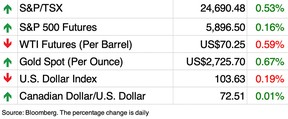BofA analysts see bullion hitting $3,000

Article content

Gold could become the “last perceived safe haven asset standing,” predict analysts who see the yellow metal hitting US$3,000.
Of all the forces that drive gold prices, one is rising: fear that fiscal policies in the United States and beyond may not be sustainable, argues a BofA Global Research report entitled “Is gold a safer investment than Treasuries?”
According to analysts led by commodity strategist Michael Widmer, fiscal profligacy is bullish for gold — and you don’t have to look far for examples of that.
Advertisement 2
Article content
The analysts cite a report from the think tank, the Committee for a Responsible Federal Budget, that predicts the U.S. national debt will hit a record high just three years from now. Debt costs are also soaring, with their share of gross domestic product expected to hit new highs in coming years.
“Interest rate expenses alone are forecast to near the size of last year’s total deficit in 10 years,” said the BofA analysts.
Whoever wins the U.S. presidential election will face an unprecedented fiscal challenge, yet so far neither Kamala Harris nor Donald Trump have put forward a plan to deal with the rising debt burden.
In fact, the CRFB says the tax and spending plans of both would likely increase deficits and debts above levels currently projected. Harris’s plan is estimated to increase debt by US$3.5 trillion through 2035 and Trump’s would raise it by US$7.5 trillion.
“The CRFB highlights that the large and growing national debt threatens to slow economic growth, boost interest rates and payments, weaken national security, constrain policy choices, and raise the risk of an eventual fiscal crisis,” said the BofA analysts.
Article content
Advertisement 3
Article content
America is not alone. An analysis of platforms in advanced economies suggests policy makers favour fiscal expansion as countries face the challenges of climate change, an aging demographic and rising geopolitical risks.
The International Monetary Fund estimates that new spending could amount to 7 to 8 per cent of GDP annually on average for the global economy by 2030.
“Ultimately, something has to give: if markets become reluctant to absorb all the debt and volatility increases, gold may be the last perceived safe haven asset standing,” said BofA.
There are already signs that investors are getting nervous. In a recent BofA survey, the majority of respondents said that U.S. fiscal risks are underpriced.
“In other words: there are concerns as to whether markets will be able to absorb all of the debt,” the analysts said.
This would give central banks, which are large holders of government bonds, a strong incentive to diversify their holdings with gold. These banks have already been on a buying spree, with the share of gold in currency reserves rising to 10 per cent from 3 per cent a decade ago.
Advertisement 4
Article content
“Indeed, with lingering concerns over U.S. funding needs and their impact on the U.S. Treasury market, the yellow metal may become the ultimate perceived safe haven asset,” said the analysts.
Gold, by the way, passed US$2,700 an ounce today for the first time.
Sign up here to get Posthaste delivered straight to your inbox.

Canada might be one of the United States’ biggest trading partners but you wouldn’t know it by mentions during the presidential election campaign.
“Based on what we’ve read and heard so far, the Great White North seems more like the Minor Forgotten Land,” said National Bank of Canada economist Warren Lovely in a September note.
The word “Canada” was not uttered once during either presidential debate and in the party platforms, only the Democrats mention us — very briefly.
“So if you’re counting, Canada has been mentioned precisely as many times as the Springfield, Ohio cats (and dogs) which Trump suggests are being devoured by immigrants. (You can’t make this stuff up.),” said Lovely.
- Today’s Data: United States housing starts, building permits
Advertisement 5
Article content

Many Canadians will likely agree that our tax system is overly complex, which is why millions hire an accountant or tax professional to prepare their tax returns each year. But, just because you hire a pro to prepare your return, doesn’t mean you’re not fully accountable — and ultimately liable — for the information contained inside it. Tax expert Jamie Golombek looks at a tax case that shows why you should always check your tax return, even if a professional prepared it. Read more
Hard earned truths
In investing, you get what you don’t pay for. In an ongoing series about what the next generation needs to know to build wealth, we offer hard earned truth #1: Investment fees are the enemy of returns. Read more.
McLister on mortgages
Want to learn more about mortgages? Mortgage strategist Robert McLister’s Financial Post column can help navigate the complex sector, from the latest trends to financing opportunities you won’t want to miss. Plus check his mortgage rate page for Canada’s lowest national mortgage rates, updated daily.
Advertisement 6
Article content
Financial Post on YouTube
Visit the Financial Post’s YouTube channel for interviews with Canada’s leading experts in business, economics, housing, the energy sector and more.
Today’s Posthaste was written by Pamela Heaven, with additional reporting from Financial Post staff, The Canadian Press and Bloomberg.
Have a story idea, pitch, embargoed report, or a suggestion for this newsletter? Email us at posthaste@postmedia.com.
Bookmark our website and support our journalism: Don’t miss the business news you need to know — add financialpost.com to your bookmarks and sign up for our newsletters here
Article content










